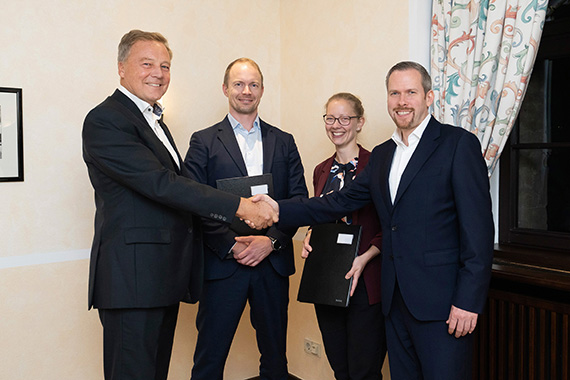More news
- Asian paint regulatory round up – Indonesian exterior paint still uses lead, warns W...
- Nigeria’s paint industry navigates regulatory changes and economic challenges amid p...
- Focus on the global coatings market: Global coatings market outlook
- Ask Joe Powder – October 2024
- Chinese paint majors look to domestic consumer sales as commercial real estate slumps

BASF, a global battery materials producer and battery recycler, and Stena Recycling, one of Europe´s leading recycling companies, offering comprehensive solutions in recycling and circular services, have entered into a black mass purchase agreement. This agreement is part of a broader collaboration envisaged by BASF and Stena Recycling with the goal of setting up a battery recycling value chain for the European electric vehicle battery market.
The focus of the co-operation will be on developing improved black mass production processes to achieve high recovery rates for metals such as lithium, nickel, and cobalt to support closed loop solutions for the European electric vehicle battery market. Collection, assessment, and pre-treatment of end-of-life lithium-ion batteries, followed by black mass production are the first steps in the battery recycling process. Black mass is produced by mechanical treatment of end-of-life lithium-ion batteries and battery production scrap. In a second step, valuable metals, such as lithium, nickel, cobalt and manganese, in the black mass can be chemically recovered. Following the collection of end-of-life lithium-ion batteries and battery production scrap, and the production of black mass by Stena Recycling in Halmstad, the black mass will be further processed in BASF’s prototype metal refinery in Schwarzheide. Stena Recycling and BASF aim to transfer such a model into BASF’s planned commercial scale battery recycling metal refinery in Europe.
READ MORE:
Focus on automotive: Growth in electric vehicle sales drives adhesives innovation
“The electrification of society has only just begun, and we want to boost a circular approach to battery production. Co-operation between industry actors will be essential for a successful green transition. With this agreement in place, Stena Recycling strengthens its position as one of the leading recycling partners in Europe, to both battery manufacturers and the vehicle industry,” says Marcus Martinsson, Product Area Manager Batteries at Stena Recycling Group.
The use of recycled metals in the production of new batteries reduces a battery’s carbon footprint significantly. Battery producers and electric vehicle manufacturers in Europe can choose from a range of services. Under this collaboration, Stena Recycling will be responsible for collection of end-of-life lithium-ion batteries and battery production scrap, dismantling and discharging, as well as the black mass production. BASF will recover valuable metals from black mass and can produce new cathode active materials for new lithium-ion batteries.
“By entering into a co-operation with Stena Recycling, we are strengthening BASF’s ability to offer a broadened battery collection network with a strong partner in the Scandinavian countries so that we can expand our offer for individual and closed loop solutions to battery producers and electric vehicle manufacturers in Europe,” said Dr. Daniel Schönfelder, President of BASF’s Catalysts division, who is also responsible for the company’s battery materials and battery recycling business. “This is an important step towards a circular economy for the European electric vehicle battery market.”
Photo caption: From left: Mats Berneblad, Sales Manager Electronics and Battery Materials at Stena Recycling Group; Marcus Martinsson, Product Area Manager Batteries at Stena Recycling Group; Dr. Birgit Gerke, Procurement Manager Battery Recycling at BASF; Dr. Daniel Schönfelder, President of BASF’s Catalysts division, who is also responsible for the company’s battery materials and battery recycling business. Photo BASF SE







